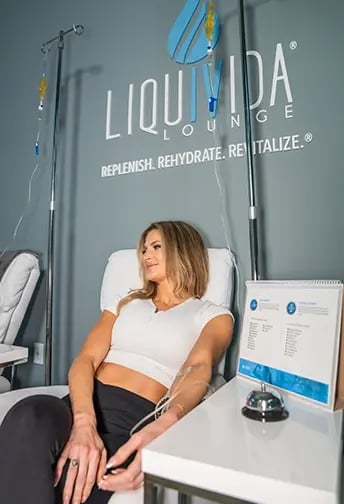
You ever wake up and feel exhausted and never really understand why? You're eating healthy, you work out, you get enough sleep, but for some reason you feel tired, weak, and not at all like you want to feel. Sometimes we think we're eating healthy and we may have a micronutrient deficiency. Sometimes it’s good to get a closer look. So what can you do? Well a good starting point is getting a lab test to see if you are getting all the right nutrients. That way you can pinpoint what minerals you may need to start feeling better. We’ll talk about those common deficiencies and how to tackle them.
What's a Vitamin D Deficiency Like?
Vitamin D is a fat-soluble vitamin that works like a steroid hormone in the body. It travels through the bloodstream and into cells, telling them to turn genes on or off. Almost every cell in the body has a receptor for vitamin D. Vitamin D is produced out of cholesterol in the skin when it is exposed to sunlight. Here in South Florida, we get plenty of it, but some of us like to keep our skin healthy by staying out of the sunlight. Although staying indoors is what causes Vitamin D deficiency. In the US, about 42% of people may be vitamin D deficient. This number rises to 74% in the elderly and 82% in people with dark skin, since their skin produces less vitamin D in response to sunlight.

Vitamin D deficiency is not usually visible. The symptoms are subtle and may develop over years or decades. Adults who are deficient in vitamin D may experience muscle weakness, bone loss and increased risk of fractures. In children, it may cause growth delays and soft bones. Also, vitamin D deficiency may play a role in reduced immune function and an increased risk of cancer. Unfortunately, very few foods contain significant amounts of this vitamin. The best dietary sources of vitamin D are cod liver oil or fatty fish, such as salmon, mackerel, sardines or trout, but obviously the best way to get it into your system is through vitamin D3 injections.
Order a Lab Test to Learn if You Have a Vitamin B12 Deficiency
We've previously talked about vitamin B12 but for those who don't know, vitamin B12, also known as cobalamin, is a water-soluble vitamin. It is essential for blood formation, as well as for brain and nerve function. Every cell in your body needs B12 to function normally, but the body is unable to produce it. Therefore, we must get it from food (specifically animal products), supplements, vitamin IV therapy or injections. That's why people who don't eat animal products are at an increased risk of deficiency. Studies have shown that vegetarians and vegans are highly likely to be deficient in vitamin B12. Some numbers go as high as 80–90%. More than 20% of elderly people may also be deficient in vitamin B12, since absorption rate decreases with age. The absorption of vitamin B12 is more complex than the absorption of other vitamins, because it needs help from a protein known as intrinsic factor.

One common symptom of vitamin B12 deficiency is megaloblastic anemia, which is a blood disorder that enlarges the red blood cells and makes you feel weak. Other symptoms include impaired brain function and elevated homocysteine levels, which is a risk factor for several diseases. Dietary sources of vitamin B12 include shellfish, liver, red meat, eggs, and milk products, but of course getting a lab test first to see if you're B12 deficient, and then decide what you want to do.
Discover a Calcium Deficiency with a Comprehensive Lab Test
We just talked about some of the best nutrients for bone health, obviously calcium is one of the most important. Calcium is essential for every cell. It mineralizes bones and teeth, especially during times of rapid growth. It is also very important for the maintenance of bone. Additionally, calcium plays a role as a signaling molecule all over the body. Without it, our heart, muscles and nerves would not be able to function.
The calcium concentration in the blood is tightly regulated, and any excess is stored in bones. If there is lack of calcium in the diet, calcium is released from the bones. That is why the most common symptom of calcium deficiency is osteoporosis, characterized by softer and more fragile bones. One survey found that in the US, less than 15% of teenage girls and less than 10% of women over 50 met the recommended calcium intake. In the same survey, less than 22% of young, teenage boys and men over 50 met the recommended calcium intake from diet alone. Supplement use increased these numbers slightly, but the majority of people still weren’t getting enough calcium.

Calcium deficiency can be very common, even if you eat food rich in calcium such as boned fish, milk, or kale. Luckily, taking a comprehensive lab test can give you a better picture of what’s happening with your body and the current status of essential micronutrients, like calcium, that way you'll now what you need to improve in order to live your life at its fullest.
Magnesium Deficiency Is No Joke.
Magnesium is a key mineral in the body. It is essential for bone and teeth structure, and is also involved in more than 300 enzyme reactions. Low intake and blood levels of magnesium have been associated with several diseases, including type 2 diabetes, metabolic syndrome, heart disease and osteoporosis. Low levels of magnesium are particularly common among hospitalized patients. Some studies find that 9–65% of them are magnesium deficient. This may be caused by disease, drug use, reduced digestive function or inadequate magnesium intake.
The main symptoms of severe magnesium deficiency include abnormal heart rhythm, muscle cramps, restless leg syndrome, fatigue and migraines. More subtle, long-term symptoms that you may not notice include insulin resistance and high blood pressure. Dietary sources of magnesium include whole grains, almonds, dark chocolate, and leafy greens. But again, you need to see if you're magnesium deficient in the first place by taking a lab test. Then once you get your results, check out Liquivida's appropriate nutrient drips to get your needs taken care of.
Ready to Order a Lab Test at Liquivida?
Book a consultation at any Liquivida Lounge and ask the medical team about the benefits, requirements and recommended scenarios to take full advantage of a comprehensive lab test. The process itself is fairly simple and you’ll get to see what your body may be lacking, and most important how to bring it to the right levels so you can start feeling better.
It’s always good to know what’s going on with your body, you never know what could be going on, unless you see the results. So get a blood test today, and your deficiencies may become deficient!








 By Liquivida®
By Liquivida®


